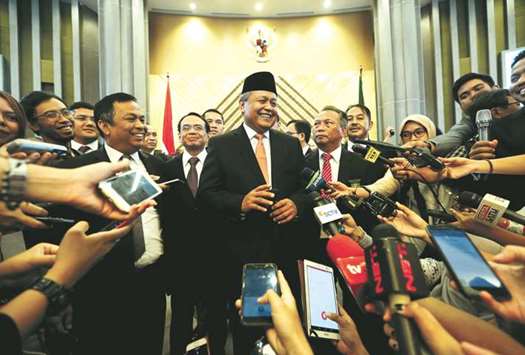A central bank chief’s first day on the job doesn’t get much tougher than this.
When Perry Warjiyo was named as Bank Indonesia’s new governor last month, a rout in global emerging markets was only just starting to take hold.
With the rupiah having slumped almost 3% against the dollar since his appointment, and investors continuing to dump the nation’s stocks and bonds, the 59-year old faces a trial by fire.
Warjiyo wasted no time in setting the tone of his approach in office, telling reporters shortly after he was sworn in yesterday that the central bank will use monetary policy to stem the selloff.
“Bank Indonesia is committed to maintaining stability of the exchange rate,” he said. “We plan on being pre-emptive, we will implement a front-loading policy and be ahead of the curve in our policies.”
Warjiyo said his priority in the short-term will be to strengthen measures to stabilise the rupiah, disclosing that authorities had bought 50tn rupiah ($3.5bn) of government bonds this year, with 13tn rupiah being spent this month alone. Indonesia has been swept up in a global emerging market rout and is bracing for further turmoil as US interest rates rise and the dollar strengthens.
The rupiah this week slumped to its weakest level in two-and-a-half years despite Bank Indonesia’s increased intervention and its first rate hike since 2014 last week.
Warjiyo’s comments helped to calm the currency, which rose 0.3% to 14,161 against the dollar as of 2:30pm in Jakarta, paring its decline for the year to 4.2%.
The Jakarta Composite Index surged as much as 2.7% as foreign investors finally returned to the market after withdrawing money for 21 straight days.
A deputy governor for the past five years, Warjiyo has been with the central bank for more than three decades – during both the Asian financial crisis and 2013’s so-called taper tantrum.
“He’s the right man,” said Melchias Mekeng, a lawmaker who chairs the Indonesian parliament committee that oversees financial affairs. “Much of his time has been in monetary policy. His background is very complete.” The central bank raised its benchmark interest rate last week to 4.5% and pledged to take “stronger measures” to maintain stability.
It stressed vigilance to global risks, including Federal Reserve hikes, higher US Treasury yields, rising oil prices and trade tensions.
Warjiyo didn’t attend the policy meeting because his term as deputy had ended.
The last time Bank Indonesia experienced this kind of turmoil was in 2013 – when the Fed raised the prospect of paring back US bond-buying, roiling emerging markets.
That kicked off an aggressive tightening cycle in Indonesia that saw 175 basis points of hikes in just five months.
Warjiyo is likely to follow a more moderate path, says Joey Cuyegkeng, a senior economist with ING Groep NV in Manila.
“With further weakening of the rupiah, more monetary action is likely and could be as early as the June meeting,” Cuyegkeng said.
But “a less aggressive tightening cycle is likely.”

Perry Warjiyo, Indonesia’s new central bank governor, speaks to the media following his inauguration in Jakarta. Warjiyo said his priority in the short-term will be to strengthen measures to stabilise the rupiah, disclosing that authorities had bought 50tn rupiah ($3.5bn) of government bonds this year, with 13tn rupiah being spent this month.
